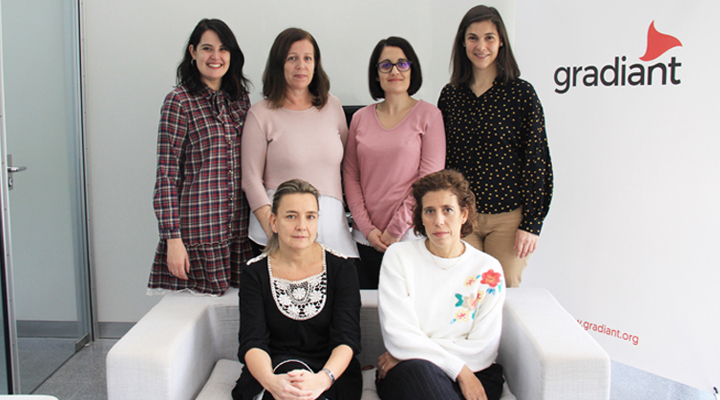
2018 has been a very special year for Gradiant. We have just completed our first 10 years as a centre and our technologies have crossed borders. It has also been the year in which we introduced you to our women technologists. This time, we would like to dedicate this first post of the year to introduce you to the other women colleagues who are part of our team and who work hand in hand with technology every day. They are Paula Tosar (PT), Communication & Marketing manager, Natalia Rivas (NR), secretary, Leticia Torrejón (LT), Recruiter & Talent Manager, Iria Pérez (IP), Legal & Labour Manager, Isabel Codes (IC), Economic & Financial Manager and Sara Campos (SC), Operations & Support Manager; and today they tell us what made them to join the ICT sector.
What is your professional profile?
All: We are part of the “other area” of Gradiant that is Support and we are focused on supporting the rest of the team.
IP and LT: In particular, we are in charge of Gradiant’s work management, personnel management and talent management respectively.
SC: In my case, I am often told that I act as a hub between the technical part and the management part.
NR: I handle administrative tasks, as well as providing general support to the centre on different issues, such as travel management, visitor reception, room coordination, etc.
IC: My profile is focused mainly on economic and financial management.
PT: I design the marketing and communication strategy for the centre and its products.
How did you come to work in the technological arena?
SC: I worked as a product manager for an ERP (Enterprise Resource Planning). I heard about a very interesting project that was coming up (Gradiant) and I didn’t stop until I joined it.
LT and IC: We already worked in companies involved in the telecommunications sector before joining Gradiant, but the truth is that the technological sector came to our professional career by surprise.
IP and NR: By a nice coincidence! We were lucky to enter this sector.
PT: I’ve always been professionally focused on strategic marketing in the business field. I was lucky enough to start my way in the technological field in a research center of the University of Vigo (AltanTTic) and from there (as in Galicia there are not too many specialized profiles in this field) I moved to Gradiant. And it has been one of the best things that have happened to me. Especially this past year, when Communication and Marketing team organized the 10th anniversary.
What does the technology sector bring to you?
IP and LT: It brings us a lot of things, but we highlight the specialization in a sector that is constantly in change. In addition, and we talk about HR management, we deal with very specific and special profiles that force us to be very careful and constantly update ourselves. We enter in “their world”.
SC, IC, NR: Passion for work, which is associated with dynamism, teamwork, creative spirit, freshness, willingness to learn, collaboration and cooperation.
PT: I agree with everything my colleagues have commented on: dynamism, teamwork, being able to learn new and so different things every day… In addition, the possibility of developing from Galicia a job that normally I could only develop in big capitals.
What do you have to offer?
All: To the sector, we provide another perspective and vision, besides the purely technical one. In Gradiant’s case, we help and support the rest of the “gradients” in those issues that have to do with the operational management of projects, financial operations, HR, administration and also to be the “loudspeaker” of everything that is doing here, from the Communication and Marketing department. We also come back them down to earth (laughter).
What would you say to the technologist of the future?
IP, IC, LT, NT: We would tell them that technology is a very interesting sector, in which there are a lot of different matters to specialize in if you are really motivated. We would like to push everyone who is interested in technology into it, because it has a lot of future, both technically and at work.
SC: Technology is necessary but they should also think about the final user of that technology. They should always think of this user and integrate different profiles into their teams so that they can provide a different perspective and knowledge. We have all come across a product with a great technology behind it, but if usability is not good the product is not good. The challenge is to develop quality technology for non-technological users.
PT: I subscribe each word of my colleagues. As Sara said As Sara says, we have to remember that customers, the people who read or listen to us, are not always part of the technological field and what we do may seem very far from everyday life. Technology is present in our day to day, so we have to show what can be done and how technology can help people.


